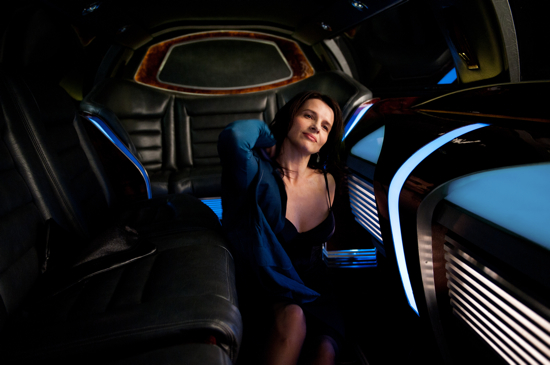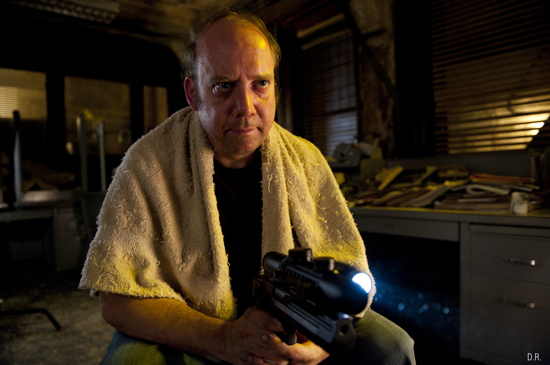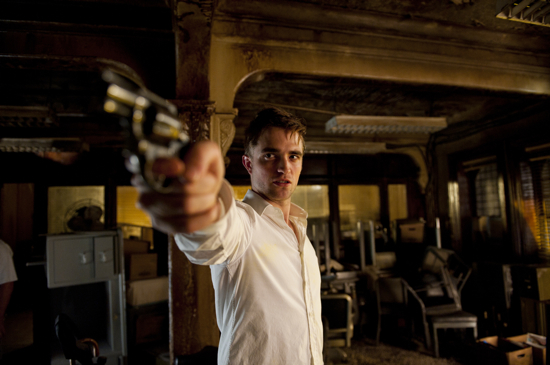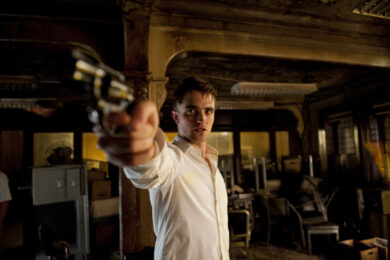It’s the fault of my expectations. I went into David Cronenberg’s Cosmopolis hoping for a strange ride and I got one. It just isn’t the ride that I and many of the director’s fans had been hoping for. The trailer made it look like a weird-out return to form, but a read of Don DeLillo’s source novel had me doubting my assumptions, as it consists mainly of philosophical discussions in which folk speaking at cross purposes obliquely debate the nature of modern capitalism. What was Cronenberg, a director with a reputation for the visceral, going to do with this? The answer is ‘very little’ – and that’s both the film’s strength and its major flaw.
The story is simple. Multi-billionaire asset manager Eric Packer (played with insectoid impenetrability by Robert Pattinson and, yes, he is very good looking isn’t he?) wants to take a drive across New York to get a haircut at his childhood barber’s. Simple enough, except that the President’s in town, a rapper’s funeral is snarling up the traffic and anti-globalists are staging a violent protest in the city centre. Undaunted, Eric sets off, and his massive luxury limousine and the cafés and hotel rooms that line his route become the stages for a series of empty debates with the people who cross his path. These include Juliette Binoche’s art dealer Didi Fancher, with whom he shares a brutal, emotionless sex scene that is pure Cronenberg, and Mathieu Amalric’s pie-flinging subversive Andre Petrescu (aka The Pastry Assassin).
Cronenberg extracts large chunks of DeLillo’s glacial dialogue and shoves them into his actors’ mouths like fistfuls of foreign currency. To be fair, most of them make a decent go of it, and it’s not as if clunky dialogue is a new problem with the director’s literary adaptations: both Naked Lunch (1991) and Crash (1996) are peppered with howlers. There’s nothing as bad here as Judy Davis announcing "a Kafka high" in the former, a line which makes me stick my fingers in my ears and go na-na-na-na-na every time I know it’s coming up. No, what separates Cosmopolis from Cronenberg’s other work is the subject of the conversations and how it sits at angles to the world he presents.
Eric Packer is self-obsessed, preening and so used to being the King of Big Shit Mountain that he monologues for ages on his wants and needs without giving a second thought as to whether anyone in his vicinity actually cares about what he’s saying. He’s also extremely clever, a man with a near-psychic ability to read the markets and benefit from their trends, while using them to justify the behaviour of the world outside his limo.

Everything here is presented as a by-product of the markets. Protests are criticised for their lack of insight; would-be assassins are calmly scrutinised and found wanting. One senses that nothing is modern enough for a man like Packer. A man so far ahead that he can calmly lose his fortune in a day and not care about the consequences. He has no need for the symptoms of capital, whether they’re violent demonstrations or the latest flat screen monitors. At one point a protestor is shown setting himself on fire through the car windows. Under normal circumstances this would be vintage Cronenberg, a chance to stew in the goo of flesh failure, but the immolation is presented as a hot smudge through tinted glass – a smudge that one of Packer’s advisors (Samantha Morton) dismisses as "unoriginal".
This feels like something of an about-face for the director. His prior pictures made no bones about presenting the body as one of the last battlegrounds worth fighting on: a place of violent transfiguration and renewal that allows the director to revel in his love of messy effects. Presenting the violence at a remove feels like an admission that the game has changed. That in the face of the nebulous aggression of the markets our bodies are a needless obsolescence, and anything we can do to them is simply a distraction, to be disregarded with a shrug of the shoulders and a bored sigh.
This lack of authenticity of feeling is another theme. Packer wants to go to his childhood barbershop for a haircut – he wishes to reconnect with something he sees as real and impermeable – yet this realness is trapped in his past. Inaccessible. The only time he is seen to show anything resembling genuine emotion is when the limo passes a dead rap star’s funeral cortege. It’s grief as a sideshow, an insincere touching of base with the human before he moves on and it’s forgotten.
None of the characters notice this disconnect of course. Their conversations rumble past each other like empty goods trains, sentences hanging in the air waiting for fulfilment. They circle each other, making it impossible to care for their arid transactions – sexual, conversational or, in the case of Packer’s bored WASP wife Elise (Sarah Gadon), marital. While this may make a perfectly sound philosophical point, whether it makes for a good movie is open to debate. The problem with depicting ennui, even on such a grand scale, is that it’s boring. In a world where a main character can shoot himself in the hand and elicit nothing more than a whimper and a shrug, what is left for an audience to feel?

In order for the film to work we need to become as desensitized as Packer himself, and in giving the bulk of the screen time to philosophical musings Cronenberg has hit upon an effective if deadening strategy. The film I was reminded of most was Richard Linklater’s horribly smug Waking Life (2001). It shares that movie’s Pilgrim’s Progress-like construction, but rather than dreary ruminations on the nature of dreaming offers dreary ruminations on the nature of money.
Cosmopolis is a sour, gleaming deconstruction of the power of early 21st century capitalism. A deconstruction that offers no freedom, merely another series of corridors for us to run down. Our imagined escapes – be they drugs, sex or even death – are merely another way of feeding the wolves that prowl the edges of our lives. These fears are all the more frightening for their impenetrability and the knowledge, buried deep, that we created them and maybe even need them. In such a realisation lies the film’s strength. Its director’s inability to make this something we care about is its fatal weakness.



